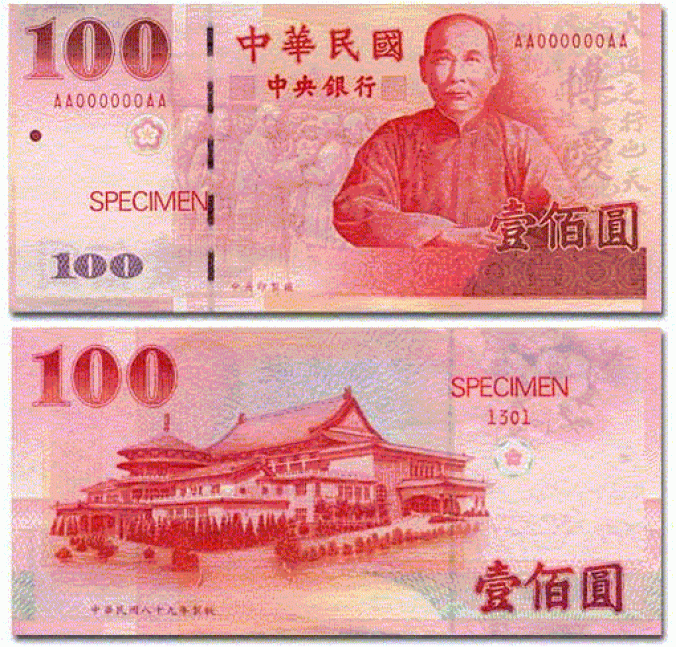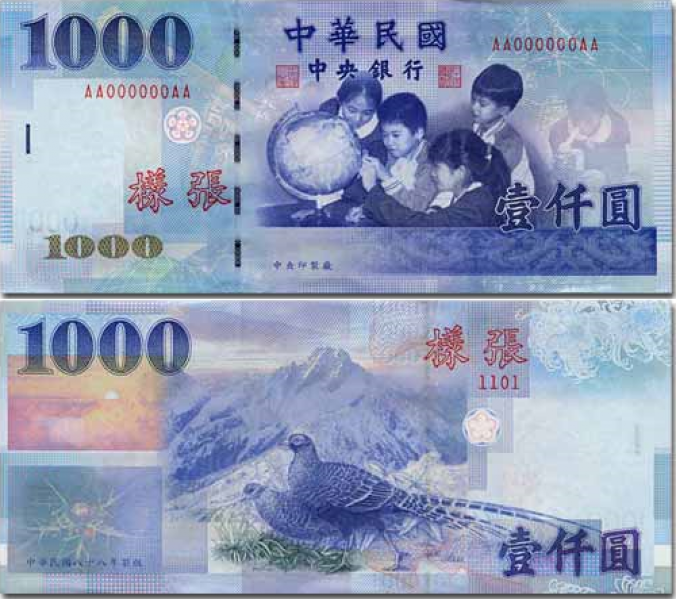The New Taiwan dollar is the official currency of Taiwan (Republic of China). The currency code is TWD and is commonly abbreviated as NT$ or simply $ in front of the amount, or a Chinese character 元 (pronounced yuán) following the amount.
For example, prices could either be displayed as: "NT$30" or "30元".
The official name of the New Taiwan dollar in Chinese is 新台幣 (新台币 in simplified Chinese), pronounced Xīntáibì.
Many people refer to currency in Taiwan as kuài (塊, or pieces) as an informal way to describe amounts of money, as yuán is difficult to pronounce repeatedly and is reserved for more formal situations. For example, NT$30 could be stated as "thirty NT", "thirty dollars", "thirty yuan", or, most commonly in informal situations, "thirty kuai".
NT dollar bills are most commonly denominated in NT$100, NT$500, and NT$1000. While NT$200 and NT$2000 bills are in circulation, they are very rarely encountered. Hard coin currency is denominated in NT$50, NT$10, NT$5, and NT$1 (the smallest denomination).
It is very easy to convert foreign currency such as US Dollar, Hong Kong Dollar, Philippine Peso, and others at most banks and select department stores in Taipei City. It is recommended to use an ATM card to withdraw cash at the MRT or convenience stores for ease and the best rates. Historically, exchange rates between TWD and USD have been around US$1 = NT$29-31.
Updated exchange rate information and a converter tool can be found here.
Where do I change money?
Taiwanese law mandates that currency exchanges must be carried out by a bank or licensed partner. Most banks in Taiwan will perform currency exchange, but the process requires bringing a passport for identity verification. Department stores such as Shin Kong Mitsukoshi (新光三越) in Xinyi Shopping District nearby Taipei 101 are also licensed to exchange currency. It is recommended to exchange currency at the airport (due to good market competition), or even better to directly use an ATM card. Cards accepted at ATMs include MasterCard/Cirrus, Visa/Plus, JCB, and China Unionpay. Acceptance may vary at different banks.
For visitors in Taipei City looking to exchange cash, it is easiest to go to Songshan Airport, located along the MRT Brown Line.
There is an NT$100 surcharge for 7/11 (CTB) and FamilyMart (Taishin) ATMs, while the MRT and HiLife (Cathay) and OKMart (Union) ATMs do not appear to have a surcharge, however 7/11 ATM seems to be more reliable for foreign cards. Post office ATMs and smaller banks may reject foreign cards. All ATMs dispense NT$1,000 banknotes, and some may also dispense NT$100 banknotes. Note that there may be charges between none and 3% on a currency change and cross-border transaction for certain cards (carried out by the MasterCard/Cirrus or VISA/Plus network), and remember to inform your bank of intent to visit Taiwan so the transaction is not blocked.
Credit cards are widely accepted in shops, and most vendors will only accept cash. Payment types that can easily be used in Taiwan include Apple Pay, Android Pay, Samsung Pay, Visa, Mastercard, JCB, American Express (less common), and Unionpay. Diners Club and Discover cards (while very useful in China, Korea, and Japan) are next to useless in Taiwan besides a cash advance at a Citibank ATM and limited acceptance at Taishin Bank and NCCC terminals. Using a credit card when possible is recommended since exchange rates will be offered at or close to the interbank wholesale rate. Many credit cards, especially those tailored for travellers, offer 0% fees on cross-border and currency exchange transactions. The best advice is to call your card's issuing bank and ask them to explain the fees. In general, the convenience of not having to worry about too much cash is worth a few percentage points, which will be further off-set by the preferable exchange rate over cash. Those carrying credit cards such as Visa Signature or Infinite, or MasterCard World or World Elite will most likely have no cross-border or foreign transaction fees, however this varies based upon the issuing bank. These cards may also provide some free insurance benefits (such as luggage protection and/or medical coverage) or cash-back promotions.
It is not recommended to exchange Thai Baht (บาท) cash, HK Dollar cash, Singaporean Dollar cash, or Philippine Peso cash due to terrible cash exchange rates and limited acceptance in Taiwan. Use an ATM or first obtain US Dollars which may also directly be accepted at Duty Free shops and some department stores that have currency exchange facilities (USD always retaining best convertibility). Bank of Taiwan (台灣銀行) generally provides the largest acceptance and best rates, and Singapore Dollars are best exchanged at Mega Bank (兆豐).
PRC China Renminbi cash may also be exchanged at some banks, but the rate is unstable (may be far above or below the domestic China rate) due to it being traded in a less controlled environment ("off shore market"), and will be regarded not as code CNY (China domestic RMB trade code), but CNH or CNT depending on which bank is making the exchange, so directly swiping China Unionpay (银联) cards for purchase or ATM Withdrawal (7/11 ATM has promotions for Unionpay withdrawal) are the best choice to avoid this hassle, as is directly using Alipay or Tenpay (Wechat) with merchants.
More articles on GuideToTaipei.com about Taiwan's history:


